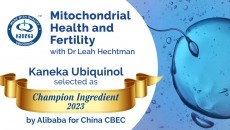South African astaxanthin receives funding boost
of the European astaxanthin market, after receiving R3.7m (€0.4m)
in funding to develop its technology and establish a pilot
facility.
Cape Carotene's funding boon comes from the Biotech Regional Innovation Centre for the Western Cape, Cape Biotech. The initiative, part of the government Department of Science and Technology, aims to foster new nutraceutical firms in the region.
Although the company's initial aim is to export the astaxanthin to European fish farmers and feed manufacturers, its long-term goal is the human nutraceutical market.
Upington-based Cape Carotene is presently in the process of developing its production technology, which involves growing microalgae in small, shallow ponds then stressing it through dehydration. This stimulates the algae to produce the red-coloured nutrient, which is not only used as a pigment by the fish farming industry but has also been shown to be an antioxidant even more potent than vitamin E.
According to Cape Business News, two South African companies are currently manufacturing synthetic astaxanthin, but Cape Carotene looks to be the country's first supplier of the antioxidant in its natural form.
Annual growth of the global market for astaxanthin for human use is thought to be at least 15 per cent, with current estimates valuing the market at $15-20m (€12.4-16.6m) per year.
Cape Carotene's Europe-oriented strategy could be well-timed, since although the European market is still considerably smaller than the Japanese and US (the carotenoid only gained approval for use in the EU in May 2005 for use in nutraceuticals with a daily dose of up to 4mg), there is hope that the growth rate here could be as much as 30, 40 or 50 per cent.
Other companies have already started investing in Europe, and may have a march on the fledgling company in the European stakes: for instance, Israel's Algatechnologies and Sweden's BioReal have both this year dramatically increased capacity, and BioReal has also had its astaxanthin approved as substantially equivalent to that already granted novel foods status in the bloc. Hawaiian player Cyanotech has also applied for substantial equivalence.
Moreover, existing applications patents are carved up between Fiji (parent company of BioReal), Valensa (formerly US Nutra) and Cyanotech.
However in a recent interview with NutraIngredients-USA.com, Cyanotech president Gerald Cysewski said he believes that it bodes well for the ingredient's overall fortunes that companies are seeing the potential. Moreover with more parties conducting clinical trials, the science base behind astaxanthin is growing.












